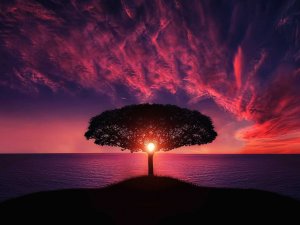Is life a matter of chance, a roll of dice? Are life-choices fated or random?
Let armchair theologians, Sikh or non-Sikh, who read their sacred texts literally wrestle with it. They see God as micromanaging every moment of everyone – kindly for a believer of their faith, wrathfully otherwise.
Sikhi asks that life on Earth be meaningfully productive, so fatalism in Sikhi baffles me. Life, however, turns on a dime; a wooden nickel might be a better metaphor.
President Franklin Roosevelt’s initiatives during the great depression had their detractors. One day, FDR missed an assassin’s bullet by accidentally being moments late to an assignment. Otherwise, Nance Garner would have become president, and who knows what the national response to the economic meltdown or the proposed social programs might have been.
1960: an American, incensed at the election of a Roman Catholic (Kennedy) as President, planned to assassinate John Kennedy. He was set to do the deed as JFK walked to his car. The shooter aimed. Right then Jackie walked out with their new born son to wave goodbye. The assailant held back – he didn’t have the heart to risk killing a mother and child.
The heart has its reasons of which reason knows not.
Education ultimately is training of the mind, no matter if we are imparting the complexities of rocket science or something simple as how to read the word C-A-T. Life tells me that education happens only when the student becomes uneasy with the status quo.
A curious mind is an open mind. But human nature seeks the path of least resistance; it wants harmony and peace with its environment, no matter how ugly. Inertia comes, less from laziness and more from its primary imperative – self-preservation.
How do me make life’s decisions? I sense that most choices are made in a process that transcends rational analysis, almost like the flip of a coin. Then we use whatever intellect, little or much, that life has gifted us to justify the choices we have made.
Imperatives of deliberative change do not exist when life is copacetic, with no challenge ahead, no danger or risk. But how to react if disharmony exists with the world around us? Stress and tension drive us. When to stand our ground and when to walk away from the “slings and arrows of outrageous fortune?” Let’s stumble through two models.
At the risk of oversimplifying humanity’s rich heritage whence a sense of self flows and gels, let’s divide human existence into two divergent models.
Take, for example, a mind steeped in the timeless traditions of India. How does it deal with the upsetting, terrorizing, violent reality of life? Simple: “Close your eyes, connect with the peace that lies at your core; turn off the surrounding world and its noise. The inner reality is unbelievably seductive. Accept it, nurture it, live in peace.”
“Avoidance” or strategic thinking? But wait; the other side of the coin beckons.
With acceptance of offensive reality, one can live in filth, disease, pestilence and injustice for untold centuries; like a stoic remain indifferent to the world. The onus shifts to God – fate – for the good fortunes of others and our setbacks.
Is this Sikhi’s defining idea of Hukum? No. Hukum does not mean that a God somewhere in an unknown postal zone micromanages our individual lives – distributing pain and pleasure, success and failure at whim. Hukum says that no matter how great or small our human efforts, many a time the results, good or bad, remain beyond our calculus. Hukum… the moving finger writes and moves on, in the words of Omar Khayyam. Accept this gracefully and move forward. But be careful; extreme unquestioned acceptance produces passivity — ostrich-like burying the head in the sand. Explore India’s history for this morality play.
Hence, India’s colonial past shocks me but doesn’t surprise me, nor does its burden of caste, unequal place of women, rampant poverty, filth and corruption. With eyes closed to existing reality or its reform, peace at any cost becomes the ideal. Ancient mythology and Bollywood help. Distorted reality? Yes. But turn inwards and revel in how wonderful and glorious we always were. Reject climactic shift in the mind that is a prerequisite for existential evolution or revolution; it would be too labor intensive.
In such a worldview progress becomes unnecessary, even undesirable.
I promised you two models of reaction to dissonance between our inner reality and the world around us, both unsatisfactory. This was one. An alternative is the typical American outlook; a continuous struggle with no such thing as a free lunch.
Open your eyes, look around to see how the world is, then look within to dream how the world should be. Do not stop. Be not afraid to tilt at windmills, à la Sancho Panza. Dreams drive the action. The mind says: I may die trying but I will make a difference; my dreams will give meaning to my life.
Often dreams come true, societies are reinvented and rejuvenated. Imagination, ideas and technology get free rein. Awesome progress results. Again, the other side of the coin beckons. And there is a price to pay.
Society becomes unstable; body and mind suffer. The vulnerable human spirit – families and individuals – fractures. Psychologists, psychiatrists, counselors, lawyers — influential caretakers — come to define society and control its levers.
A heavy price to pay! There must be a better way than these two models – and there is.
The Sikh world view emerged in the Indus valley of Punjab in North India; its ideas reflect both Eastern and Western perspectives. The ancient and the modern come triumphantly together in Sikhi to create a whole that transcends the sum of the parts.
India born Englishman Rudyard Kipling lamented that “East is East and West is West, and never the twain shall meet.” In Sikh view the two need never be sundered as in the traditional divide between the East and West. A life of action facilitates connecting with the common Ultimate Reality.
The same spark of divinity is in each of us, along with some of the devil’s best. Guru Granth offers clearheaded advice to nurture this divinity while building a productive life. This becomes the purpose of life (Munn
too jote saroop hae(n), apnaa mool pehchhan p. 441). Sikhi exhorts us to live productively for the common good (Uddam Karendian(n) jio too… p. 522). It asks us to accept responsibility for our actions (aapan hathee apnaa aapay hee kaaj savaryae, p. 474), finally to reflect on what footprints will we leave in the sands of time at the end of our days (Eh sareera meriya is jug mae ayekae kia tudh karam kamayya Guru Granth, p. 922).
Nothing could be more simply laid out than these overarching lessons of life. The living of these words then becomes a life of action.





